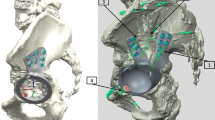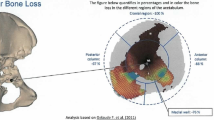Abstract
Introduction
Acetabular revision arthroplasty using jumbo cups for moderate-to-severe acetabular defects has varied outcomes. We evaluated the clinical and radiological outcomes of acetabular revision arthroplasty using a press-fitted jumbo cup and sought to identify factors that influence outcomes during intermediate follow-up.
Materials and methods
Eighty patients (47 men, 33 women; 80 hips) who underwent acetabular revision arthroplasty using press-fitted jumbo cups were included. The mean follow-up period was 10.4 years. Harris hip score (HHS), presence of groin pain, radiographic results, and Kaplan–Meier survival curves were evaluated. Implant design and surgery-related and patient-related factors were assessed to identify influential factors for cup loosening. Migration and wear analyses were performed using Einzel-Bild-Röntgen-Analyse software.
Results
The mean preoperative HHS of 53 had improved to 77 at the final follow-up (p = 0.005). Nine patients experienced groin pain. Acetabular cup loosening was observed in seven cups (8.7%), and one jumbo cup was replaced with a reinforcement cage. The survival rate of the acetabular cup was 91% at 16 years according to the Kaplan–Meier analysis. Osteolysis was identified around the cup in six cases (7.5%). Acetabular cup loosening occurred more frequently in patients with conventional polyethylene liners than in those with highly cross-linked polyethylene liners (p = 0.045). The mean total migration was 1.52 mm, and the mean total wear was 0.98 mm. There was a positive correlation between total migration and total wear (p = 0.023; Spearman’s rho = 0.388). The mean wear rate of the patients with the cup inclination angle < 50° was significantly lower than those with the cup inclination angle > 50° (p = 0.001). There were four cases of complications (three dislocations and one infection) that did not require revision surgery.
Conclusion
Press-fitted jumbo cups for acetabular revision arthroplasty exhibited encouraging results during follow-up for an average of 10 years. Use of highly cross-linked polyethylene liners and proper placement of the acetabular component with an inclination angle < 50° may contribute to better clinical outcomes after acetabular revision arthroplasty with jumbo cups.




Similar content being viewed by others
References
Della Valle CJ, Berger RA, Rosenberg AG, Galante JO (2004) Cementless acetabular reconstruction in revision total hip arthroplasty. Clin Orthop Relat Res 420:96–100
Harris WH (2001) Porous hemispherical sockets: when round is right. Orthopedics 24:877–878
Konan S, Duncan CP, Masri BA, Garbuz DS (2016) Porous tantalum uncemented acetabular components in revision total hip arthroplasty: a minimum ten-year clinical, radiological and quality of life outcome study. Bone Jt J 98:767–771
Garbuz D, Morsi E, Gross AE (1996) Revision of the acetabular component of a total hip arthroplasty with a massive structural allograft. Study with a minimum five-year follow-up. J Bone Jt Surg Am 78:693–697
Chen HT, Wu CT, Huang TW, Shih HN, Wang JW, Lee MS (2018) Structural and morselized allografting combined with a cementless cup for acetabular defects in revision total hip arthroplasty: a 4- to 14-year follow-up. Biomed Res Int 2018:2364269
Herrera A, Martínez AA, Cuenca J, Canales V (2006) Management of types III and IV acetabular deficiencies with the longitudinal oblong revision cup. J Arthroplasty 21:857–864
Surace MF, Zatti G, Pietri M, Cherubino P (2006) Acetabular revision surgery with the LOR cup: three to 8 years’ follow-up. J Arthroplasty 21:114–121
Garcia-Rey E, Fernandez-Fernandez R, Duran D, Madero R (2013) Reconstruction of the rotation center of the hip after oblong cups in revision total hip arthroplasty. J Orthop Traumatol 14:39–49
Regis D, Sandri A, Bonetti I, Bortolami O, Bartolozzi P (2012) A minimum of 10-year follow-up of the Burch-Schneider cage and bulk allografts for the revision of pelvic discontinuity. J Arthroplasty 27(1057–1063):e1
Abolghasemian M, Sadeghi Naini M, Tangsataporn S, Lee P, Backstein D, Safir O, Kuzyk P, Gross AE (2014) Reconstruction of massive uncontained acetabular defects using allograft with cage or ring reinforcement: an assessment of the graft's ability to restore bone stock and its impact on the outcome of re-revision. J Arthroplasty 96:319–324
Ibrahim MS, Raja S, Haddad FS (2013) Acetabular impaction bone grafting in total hip replacement. Bone Jt J 95:98–102
Kostensalo I, Seppanen M, Virolainen P, Mokka J, Koivisto M, Makela KT (2015) Acetabular reconstruction with impaction bone grafting and cemented polyethylene socket in total hip revision arthroplasty. Scand J Surg 104:267–272
Borland WS, Bhattacharya R, Holland JP, Brewster NT (2012) Use of porous trabecular metal augments with impaction bone grafting in management of acetabular bone loss. Acta Orthop 83:347–352
Jenkins DR, Odland AN, Sierra RJ, Hanssen AD, Lewallen DG (2017) Minimum five-year outcomes with porous tantalum acetabular cup and augment construct in complex revision total hip arthroplasty. J Bone Jt Surg Am 99:e49
Abolghasemian M, Tangsataporn S, Sternheim A, Backstein DJ, Safir OA, Gross AE (2013) Porous metal augments: big hopes for big holes. Bone Jt J 95:103–108
Patel JV, Masonis JL, Bourne RB, Rorabeck CH (2003) The fate of cementless jumbo cups in revision hip arthroplasty. J Arthroplasty 18:129–133
Wedemeyer C, Neuerburg C, Heep H, von Knoch F, von Knoch M, Löer F, Saxler G (2008) Jumbo cups for revision of acetabular defects after total hip arthroplasty: a retrospective review of a case series. Arch Orthop Trauma Surg 128:545–550
Gustke KA, Levering MF, Miranda MA (2014) Use of jumbo cups for revision of acetabulae with large bony defects. J Arthroplasty 29:199–203
von Roth P, Abdel MP, Harmsen WS, Berry DJ (2015) Uncemented jumbo cups for revision total hip arthroplasty: a concise follow-up, at a mean of twenty years, of a previous report. J Bone Jt Surg Am 97:284–287
Lachiewicz PF, Soileau ES (2013) Fixation, survival, and dislocation of jumbo acetabular components in revision hip arthroplasty. J Bone Jt Surg Am 95:543–548
Whaley AL, Berry DJ, Harmsen WS (2001) Extra-large uncemented hemispherical acetabular components for revision total hip arthroplasty. J Bone Jt Surg Am 83:1352–1357
Krismer M, Bauer R, Tschupik J, Mayrhofer P (1995) EBRA: a method to measure migration of acetabular components. J Biomech 28:1225–1236
Krismer M, Stöckl B, Fischer M, Bauer R, Mayrhofer P, Ogon M (1996) Early migration predicts late aseptic failure of hip sockets. J Bone Jt Surg Br 78:422–426
Ilchmann T, Mjoberg B, Wingstrand H (1995) Measurement accuracy in acetabular cup wear. Three retrospective methods compared with Roentgen stereophotogrammetry. J Arthroplasty 10:636–642
Abrahams JM, Kim YS, Callary SA, Ieso C, Costi K, Howie DW, Solomon LB (2017) The diagnostic performance of radiographic criteria to detect aseptic acetabular component loosening after revision total hip arthroplasty. Bone Jt J 99:458–464
Kim YS, Abrahams JM, Callary SA, Ieso C, Costi K, Howie DW, Solomon LB (2017) Proximal translation of %3e 1 mm within the first two years of revision total hip arthroplasty correctly predicts whether or not an acetabular component is loose in 80% of cases: a case-control study with confirmed intra-operative outcomes. Bone Jt J 99:465–474
Paprosky WG, Perona PG, Lawrence JM (1994) Acetabular defect classification and surgical reconstruction in revision arthroplasty. A 6-year follow-up evaluation. J Arthroplasty 9:33–44
Harris WH (1969) Traumatic arthritis of the hip after dislocation and acetabular fractures: treatment by mold arthroplasty. An end-result study using a new method of result evaluation. J Bone Jt Surg Am 51:737–755
DeLee JG, Charnley J (1976) Radiological demarcation of cemented sockets in total hip replacement. Clin Orthop Relat Res 121:20–32
Zicat B, Engh CA, Gokcen E (1995) Patterns of osteolysis around total hip components inserted with and without cement. J Bone Jt Surg Am 77:432–439
Stihsen C, Rath C, Radl R, Saalabian AA, Materna W, Rehak P, Windhager R (2013) Early migration characteristics of a 180 degrees porous-coated cup with 1-mm press fit. Arch Orthop Trauma Surg 133:707–712
Murray DW, Carr AJ, Bulstrode C (1993) Survival analysis of joint replacements. J Bone Jt Surg Br 75:697–704
Stihsen C, Pabinger C, Radl R, Rehak P, Windhager R (2008) Migration of the Duraloc cup after 5 years. Int Orthop 32:791–794
Fehring KA, Owen JR, Kurdin AA, Wayne JS, Jiranek WA (2014) Initial stability of press-fit acetabular components under rotational forces. J Arthroplasty 29:1038–1042
Schmalzried TP, Wessinger SJ, Hill GE, Harris WH (1994) The Harris-Galante porous acetabular component press-fit without screw fixation. Five-year radiographic analysis of primary cases. J Arthroplasty 9:235–242
Stiehl JB, MacMillan E, Skrade DA (1991) Mechanical stability of porous-coated acetabular components in total hip arthroplasty. J Arthroplasty 6:295–300
Streit MR, Weiss S, Andreas F, Bruckner T, Walker T, Kretzer JP, Ewerbeck V, Merle C (2014) 10-year results of the uncemented Allofit press-fit cup in young patients. Acta Orthop 85:368–374
Kwong LM, O'Connor DO, Sedlacek RC, Krushell RJ, Maloney WJ, Harris WH (1994) A quantitative in vitro assessment of fit and screw fixation on the stability of a cementless hemispherical acetabular component. J Arthroplasty 9:163–170
Dora C, Houweling M, Koch P, Sierra RJ (2007) Iliopsoas impingement after total hip replacement: the results of non-operative management, tenotomy or acetabular revision. J Bone Jt Surg Br 89:1031–1035
O’Sullivan M, Tai CC, Richards S, Skyrme AD, Walter WL, Wlater WK (2007) Iliopsoas tendonitis a complication after total hip arthroplasty. J Arthroplasty 22:166–170
Nwankwo C, Dong NN, Heffernan CD, Ries MD (2014) Do jumbo cups cause hip center elevation in revision THA? A computer simulation. Clin Orthop Relat Res 472:572–576
Cyteval C, Sarrabere MP, Cottin A, Assi C, Morcos L, Maury P, Taourel P (2003) Iliopsoas impingement on the acetabular component: radiologic and computed tomography findings of a rare hip prostehsis complication in eight cases. J Comput Assist Tomogr 27:183–188
Overgaard S, Lind M, Glerup H, Bünger C, Søballe K (1998) Porous-coated versus grit-blasted surface texture of hydroxyapatite-coated implants during controlled micromotion: mechanical and histomorphometric results. J Arthroplasty 13:449–458
Mukherjee K, Gupta S (2016) Bone ingrowth around porous-coated acetabular implant: a three-dimensional finite element study using mechanoregulatory algorithm. Biomech Model Mechanobiol 15:389–403
D’Lima DD, Lemperle SM, Chen PC, Holmes RE, Colwell CW Jr (1998) Bone response to implant surface morphology. J Arthroplasty 13:928–934
Little NJ, Busch CA, Gallagher JA, Rorabeck CH, Bourne RB (2009) Acetabular polyethylene wear and acetabular inclination and femoral offset. Clin Orthop Relat Res 467:2895–2900
Patil S, Bergula A, Chen PC, Colwell CW Jr, D’Lima DD (2003) Polyethylene wear and acetabular component orientation. J Bone Jt Surg Am 85(Suppl 4):56–63
Lachiewicz PF, Watters TS (2016) The jumbo acetabular component for acetabular revision: curtain calls and caveats. Bone Jt J 98(1 Suppl A):64–67
Jafari SM, Bender B, Coyle C, Parvizi J, Sharkey PF, Hozack WJ (2010) Do tantalum and titanium cups show similar results in revision hip arthroplasty? Clin Orthop Relat Res 468:459–465
Ilchmann T (1997) Radiographic assessment of cup migration and wear after hip replacement. Acta Orthop Scand Suppl 276:1–26
Hirakawa K, Bauer TW, Stulberg BN, Wilde AH, Secic M (1996) Characterization and comparison of wear debris from failed total hip implants of different types. J Bone Jt Surg Am 78:1235–1243
Devane PA, Horne JG, Ashmore A, Mutimer J, Kim W, Stanley J (2017) Highly cross-linked polyethylene reduces wear and revision rates in total hip arthroplasty: a 10-year double-blinded randomized controlled trial. J Bone Jt Surg Am 99:1703–1714
Author information
Authors and Affiliations
Corresponding author
Ethics declarations
Conflict of interest
Jun-Ki Moon, Jaejoon Ryu, Yeesuk Kim, Jae-Hyuk Yang, Kyu-Tae Hwang, and Young-Ho Kim declare that they have no conflict of interest.
Additional information
Publisher's Note
Springer Nature remains neutral with regard to jurisdictional claims in published maps and institutional affiliations.
Rights and permissions
About this article
Cite this article
Moon, JK., Ryu, J., Kim, Y. et al. Acetabular revision arthroplasty using press-fitted jumbo cups: an average 10-year follow-up study. Arch Orthop Trauma Surg 139, 1149–1160 (2019). https://doi.org/10.1007/s00402-019-03214-7
Received:
Published:
Issue Date:
DOI: https://doi.org/10.1007/s00402-019-03214-7




